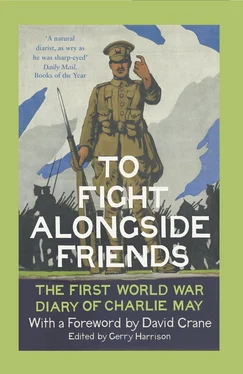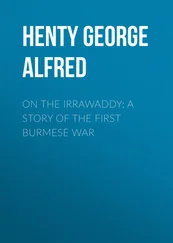I do not know if it is odd that someone so quintessentially English should come from New Zealand, or if that is part of the explanation, but Charlie May was born in that most stonily un-English of towns, Dunedin, on 27 July 1888, the son of an electrical engineer who had emigrated five years earlier. His father made his name and the foundation of a successful business with a patent for a new kind of fire alarm device, and on their return to England, Charlie had entered the family firm of May-Oatway, acting as company secretary before moving with his new wife, Maude, from the Mays’ family home overlooking Epping Forest to Manchester where, just two weeks before the outbreak of war in 1914, a daughter, Pauline, was born. It is clear that the Mays did not lose sight of their New Zealand lives – their Essex home was named ‘Kia Ora’ (‘be well’ in Maori) and Charlie would call his new home ‘Purakaunui’, after a pretty coastal settlement, near Dunedin – but in 1914 there would have felt nothing odd about such a double identity. It was famously said that sometime between the landing at Anzac Cove and the end of the Battle of the Somme the New Zealand nation was born, but in the late summer of 1914, before Gallipoli was ever dreamed of, many of the thousands of New Zealanders who volunteered to fight in a war half a world away would have seen themselves as part of a single imperial family, one corner of the great Dominion ‘quadrilateral’ of Canada, South Africa, Australia and New Zealand, on which the British Empire rested.
While still in the south May had been a member of King Edward’s Horse, a Territorial unit of the London Mounted Brigade with strong Dominion links, and, daughter or not, it was only a matter of time before war put an end to his short married idyll. On the outbreak of hostilities five divisions of a small but highly trained British Expeditionary Force had immediately been embarked for France to stem the German advance, but Kitchener for one never had any illusions that this was going to be a short war over by Christmas and within the month the first 300,000 of a New Army had responded to his call for volunteers.
By the end of September another 450,000 had volunteered, in October a further 137,000, and in the following month Charlie May enlisted into the 22nd Manchester Pals battalion – the ‘7th City Pals’ – and added his name to the five million men who would wear uniform of one sort or another before the war was over. The idea of the ‘Pals battalions’ had first been put to the test in Liverpool by Lord Derby and the city of Manchester enthusiastically followed suit, embracing the patriotic and civic ideal of a battalion made up of friends from the same street, pub, factory, profession, warehouse or football club, joining up and fighting together – ‘clerks and others engaged in commercial business,’ as Derby put it, ‘who wish to serve their country and would be willing to enlist in a Battalion of Lord Kitchener’s new army if they felt assured that they would be able to serve with their friends and not to be put in a Battalion with unknown men as their companions’.
It was a sympathetic initiative, if a double-edged one as time would bitterly show, but in the late summer of 1914, as towns across Britain competed with each other in displays of civic pride, the slaughter that would engulf whole tightly knit communities in grief still belonged to an unimaginable future. Within hours of the Lord Mayor of Manchester launching his appeal in the Manchester Guardian on 31 August, volunteers were besieging the artillery barracks on Hyde Road and by the end of the next day 800 men had been sworn in and the establishment of the first of the Manchester Pals battalions, the 1st ‘City’, or 16th Service, was complete. Over the next four days another two battalions were added, and after a late summer lull in recruiting caused by the frustrating long queues, a further three battalions in November, the 20th, 21st and Charlie May’s 22nd under the command of Lieutenant Colonel Cecil de C. Etheridge.
It would be exactly a year before Charlie May and his battalion embarked for France, and in that time an enthusiastic but improbable bunch of men drawn largely from the cotton industry and City Corporation – ‘mostly town bred’, wrote May, with a rare whiff of the King Edward’s Horse and the Empire – had to be turned into soldiers. In these early stages before their khaki uniforms arrived, they wore the ‘doleful convict-style’ ‘Kitchener Blue’ and ‘ridiculous little forage cap’ so deeply resented among the New Army, but over the next twelve months, and in the face of the universal shortages of uniforms, weapons and ammunition and every provocation and indignity an army could dream up to frustrate, bore or disillusion a civilian volunteer, the job was at least begun.
It would be as late as October 1915, by which time the 22nd were at their final camp on Salisbury Plain as part of Major General Sir William Fry’s 30th Division, before the artillery could even start firing practice or their Lee Enfield rifles and machine guns arrive. If May’s diaries from France are anything to go by, he would have taken the frustrations in his stride. With six years’ experience in the King Edward’s Horse behind him he had received his commission back in January, and he was a company commander when, in the middle of November 1915, after a last few days’ leave to see his wife and sixteen-month-old daughter, Captain Charlie May and the 22nd Battalion finally embarked from Folkestone for Boulogne.
The war that Charlie May had been trained for was not the fluid conflict of retreat and advance that the BEF had known in 1914 but the war of trenches that is how most of us now think of the First World War. In the popular memory the year 1915 seems almost like a pause between the heady optimism of the opening weeks of war and the slaughter of the Somme, but while May and the 22nd were shuffling from camp to camp – Heaton Park, Morecambe Bay, Grantham, Lark Hill – and progressing from longish ‘walks’ to bayonet and bomb practice, the bloody failures of Aubers Ridge, Festubert and Loos were teaching a bereaved nation the appalling reality of warfare along the 475 miles of earthworks and trenches, stretching in an unbroken line from the Channel to the Swiss border, that we know as the Western Front.
It was to this static, troglodytic war of attrition, mud, rats, sleeplessness and endurance that May was bound and it is as they finally set off for France that his diary begins. In the last two or three years of peace Charlie May had begun to establish himself as a journalist and writer, and the diary is unmistakably the work of a born story-teller, a man with a lyrical sense of place, an ear for dialogue, a gift for rapid and vivid characterisation, a taste for the incongruous and a need to record what he saw and experienced. ‘One gets into a habit, quite unconsciously at first, of any hold it may subsequently get on one,’ he was confessing less than a month after landing in France. ‘For instance, here did I set out, gaily and with no foreboding, upon this diary, never thinking it could become a tyrant that would ’ere long rule me, and here I am reduced to impotence when evening comes round, unable to refuse the call of these pages to be scribbled in … But fill it I must, this habit has me so in its grip.’
Charlie May’s war diaries survive in seven small, wallet-sized pocket books, written in faint pencil in his neat but tiny, italic hand, as a rich and vivid testament to this compulsion. At one level it seems rather curious that an officer of his dedication should indulge in something so defiantly in breach of King’s Regulations, but we can be grateful that he did because the result is an account that had never seen the censor’s eye, a vivid picture of battalion life in and behind the trenches during the build-up to the greatest battle fought by a British Army.
Читать дальше












